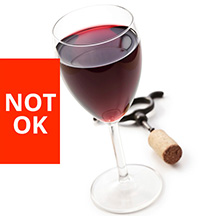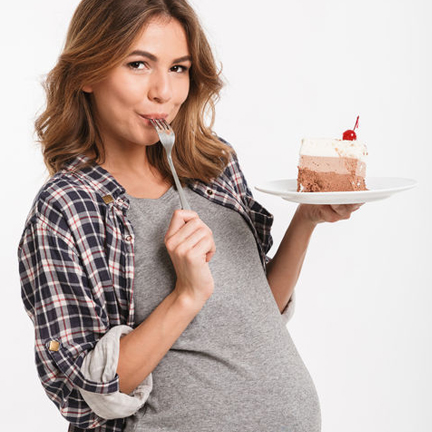 Top 7 Foods and Drinks to Avoid in Pregnancy
Top 7 Foods and Drinks to Avoid in Pregnancy
Everyone has advice for pregnant women!
Everyone, even strangers, have an opinion about what pregnant women should or should not do. This judgement holds true for what they choose to eat and drink. To every pregnant woman who has felt judged in the coffee line or desperately dreamed of a cold cut sandwich, we hear you and we get it! A few things are on the “never” eat list during pregnancy but most things just need adjustments and moderation. Let’s talk about the top 7 foods and drinks to avoid in pregnancy and what that actually means for you.
1. Raw, rare or partially cooked foods
That’s a broad list, so what does this actually mean? For those of you out there that love a nice sunny-side-up egg, medium rare steak or fancy artisan soft cheese, you’ll have to take a little break and make a few adjustments. These things along with the list below can harbor bacteria, parasites, and a specific dangerous microbe called listeria.
Listeria is a weird bacteria in that it can grow even at refrigerator temperatures! While non-pregnant people can typically tolerate and fight off an infection from these things, pregnant women are at risk for more serious illness. We also know that a woman can pass an infection to their baby without knowing they’re sick. We don’t want any type of infection of parasite taking nutrients away from you or your growing baby. Besides, can you imagine anything worse than food poisoning on top of that “morning” sickness?
Here are the raw, rare and partially cooked foods to avoid during pregnancy:
- Soft boiled eggs or runny yolks
- Raw cookie dough
- Raw sprouts
- Meat cooked less than “well done”
- Pâté
- Smoked fish often labeled as “nova-style”, lox, jerky or kippered
- Sushi
- California rolls, cooked rolls or rolls made with eel or crab are good to go!
- Soft, unpasteurized cheese:
- Most soft cheese from the grocery store use pasteurized milk so don’t skip all your favorite cheeses, just double check the label!
- Most common culprits to be unpasteurized are brie, camembert, Mexican queso blanco and blue cheese
- Skip small batch, local farm cheese (even something like cheddar) unless you can verify it’s pasteurized
2. Deli meat, hot dogs, brats and processed meat
If you ask me, there’s nothing better than a good brat right off the grill, sitting next to a lake on a beautiful Minnesota summer day! Don’t worry, that’s not just a tease, you can still eat all these things! You just need specific changes to stay safe. Processed meats like the ones above carry a risk of listeria transmission. Overall the rates of Listeria infection in this country are very low and generally processed meats are considered safe. However, as a high risk group we continue to recommend heating processed meat to a minimum of 165° or “steaming hot”. This will kill any bacteria that might have been lingering.
 3. Caffeine
3. Caffeine
Here is a place where most pregnant women craving a caffeine fix have felt some judgement or gotten the question “You want that decaf, right?”. We’re here to tell you, it’s ok if your answer is an exuberant "No!" If you want to continue to drink caffeine in pregnancy, here is our quick reference list for moderation.
- 200mg caffeine daily
- 12oz (1-2 cups) brewed coffee
- 20oz (2-3 cups) black, white or iced tea
- 2 shots of espresso
- Medium starbucks latte or macchiato (150mg)
- Medium Starbucks mocha (175mg)
 4. Alcohol
4. Alcohol
The simple answer is none. Let’s talk about why even a small amount of alcohol can’t be considered safe.
Alcohol is a small enough molecule, that it can cross over the placenta and enter the baby’s bloodstream. We can’t verify that any amount of alcohol is safe when your baby is growing and rapidly developing! While you hear rumors that a glass of wine a night is safe, we can’t confirm even a small amount is safe. If you’re struggling with avoiding alcohol please make sure you have an honest conversation with your provider! We want to listen and we want to help!
5. High mercury content fish
Don’t skip fish all together, just adjust! DHA is an omega-3 fatty acid, which is sciencey for a really important molecule. This important nutrient helps your baby build a healthy, strong brain and has been shown to improve memory and learning. Here’s a simple list of do’s and don’ts for fish!
- Low Mercury: With Moderation
- 2-3 meals/week:Fresh or canned salmon, shellfish
- 1 meal/week: Cod, pollock, haddock, canned chunk light tuna
- High Mercury: Avoid these fish
- Swordfish, albacore tuna, grouper, orange roughy
- Great Lakes: Walleye (longer than 20in), Northern Pike (longer than 30in), muskellunge
 6. Low nutrient, high calorie processed food
6. Low nutrient, high calorie processed food
Let’s get rid of the myth that you need to “eat for two”. We start to develop our taste palate and food preferences in the womb. Choosing fresh, nutrient dense foods helps your baby get a clean start and efficiently build all their organs, muscles and bones and brain. This all being said, we know that sometimes greasy fast food is all you can think about and that’s ok! If you need help figuring out what is on the high nutrient, low calorie list, just ask. We can help.
7. Unwashed fruits and vegetables
Bacteria and parasites can contaminate your food even if you pull it straight from your garden! This risk increases the more processing steps your food goes through. In pregnancy we’re specifically worried about a parasite called toxoplasma. This parasite is the same one that we think about with cat-litter boxes.
To avoid transmission of this parasite make sure you wash all fruits and vegetables (even if they’re organic!), avoid touching your mouth or other surfaces after handling raw meat or working in the garden and recruit a partner or friend to empty the litter box. If you live alone and have a cat, wear gloves and wash your hands when changing the litter!
Share this page:
About the author: Audrey Kopp, APRN, DNP, CNM
Audrey has her doctoral degree in nurse midwifery. In addition to her academic achievements, she has been actively working as a Labor and Delivery Charge Nurse in the Hennepin Healthcare system. Her entire work life and education has focused on pregnancy, moms, labor, delivery, and birth.
About her practice as a nurse midwife, Audrey says:
I believe in providing individualized care to every woman I see. Part of providing individualized care is working hard to create a familiar relationship with my patients where they can feel safe to verbalize the good, the bad and the ugly. Every woman I care for is strong and powerful in their own way. My care centers around maximizing strengths, creating a trusting bond and supporting women through each stage of their life as their needs and desires evolve.
If you are interested in booking an appointment with Audrey for your prenatal, delivery or wellwoman care, call Minnesota Women's Care at 651-600-3035 or click Book Now.
